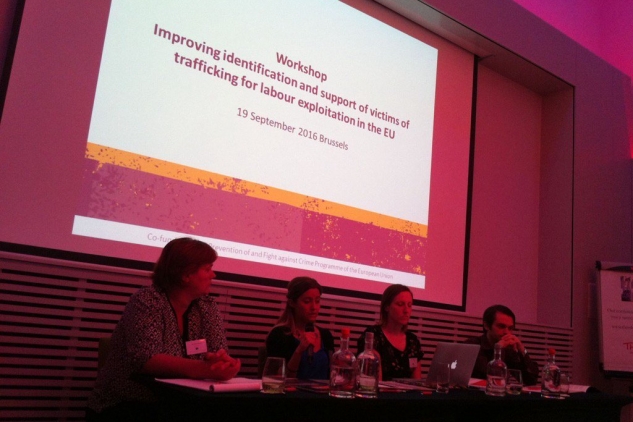
FLEX calls on EU policy makers to improve identification and support of victims of trafficking for labour exploitation
This week FLEX launched its latest policy paper, Improving the Identification and Support of Victims of Trafficking for Labour Exploitation in the EU at an international workshop in Brussels. The paper calls on EU policy makers to address key issues identified during the ‘Pro-active Identification and Support of Victims of Trafficking for Labour Exploitation in the EU’ (Pro-Act) Project, including the need for more pro-active, victim centred identification efforts and the need for comprehensive and sustainable support for victims of trafficking for labour exploitation.
Representatives from the European Parliament, the European Commission, European Confederation of Independent Trade Unions, the ILO, the office of the EU Anti-Trafficking Coordinator, PICUM and La Strada International were among those who attended the workshop. They joined Pro-Act project partners Focus on Labour Exploitation (UK), Fairwork (Netherlands), Adpare (Romania), the Latin American Women’s Rights Services (UK), and Migrant Help (UK).
Pro-Act partners presented the findings of the project, highlighting gaps in current national and international responses in three key areas:
- Provision of sustainable support and access to accommodation for victims of trafficking for labour exploitation;
- The increasing conflation of labour inspection and immigration control; and
- Access to legal remedies for victims of trafficking for labour exploitation.
The project found that urgent change is required to fulfil State obligations and ensure a comprehensive approach to human trafficking for labour exploitation at EU-level. More action is needed on the part of Member States and European bodies to effectively implement existing European obligations on support and identification of victims of trafficking, as set out in the European Trafficking Convention and the EU Trafficking Directive.
Key recommendations include:
- Access to safe accommodation and support should be protected in national legislation and practice, and should not be conditional on cooperation with law enforcement.
- Proactive labour inspection should be a key component of strategies for the prevention and identification of trafficking for labour exploitation. Labour law enforcement should be victim centred and a strict firewall should be maintained between labour inspection and immigration control.
- The uptake of access to legal remedies for victims of trafficking for labour exploitation, including access to compensation, should be monitored and reviewed to ensure easy and prompt access to remedy for all victims.
Discussions at the workshop emphasised the importance of collaborative work to monitor the implementation of the Directive across Europe. Participants cited the State’s duty to prevent trafficking for labour exploitation as a key area of concern, emphasising that prevention strategies in all member states should address labour abuses across the spectrum from non-compliance to forced labour, in order to prevent the development of situations where trafficking for labour exploitation can occur.
For more information on the findings and recommendations presented at the workshop, see the full policy paper here.
This blog reflects the views only of the author, and the European Commission cannot be held responsible for any use which may be made of the information contained therein.
